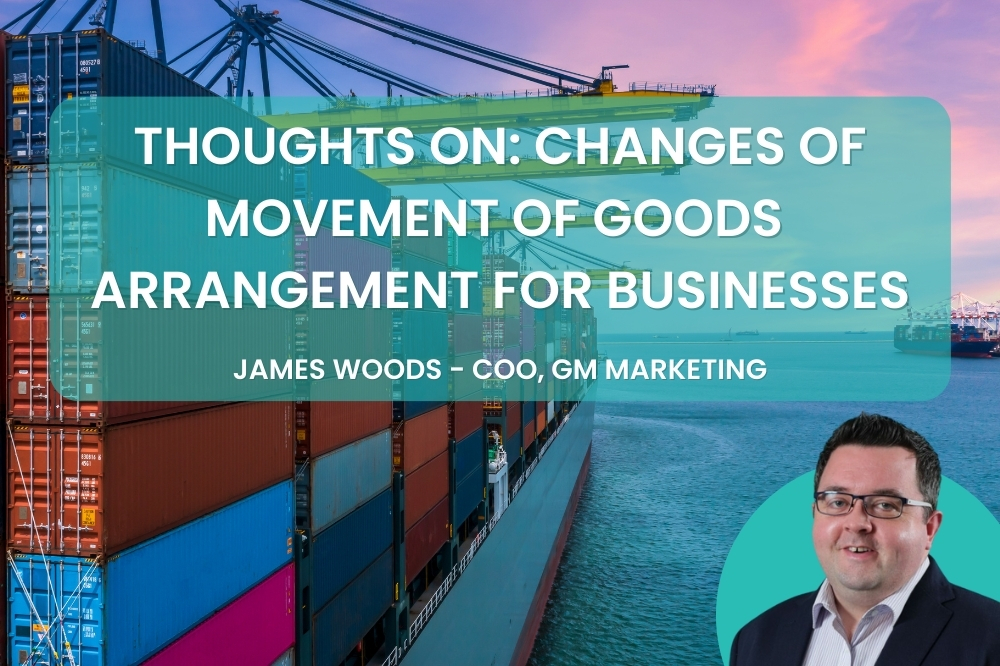COO shares thoughts on changes of Movement of Goods arrangement

Thoughts from James Woods, COO, GM Marketing:
This week marks the first week in two years of an Executive sitting in Northern Ireland, and it’s a welcome return. Last week’s headlines focused on this ‘new agreement’, however for businesses like ours, who move goods from east to west, and north to south, the impact of this deal on the movements of goods is still not completely clear.
Is the movement of goods that remain in their entirety within the UK now seamless? Has the green lane gone to be replaced by the U.K. Internal Market System Lane which will have no checks? And most significantly, is there no requirement to complete Supplementary Declarations?
Is the ‘Irish sea border’ no more and if that is the case, from when does that change take effect and what traders can avail of it?
This is hugely important to us at GM Marketing as we’re transporting thousands of products for household names such as Tilda Rice, Nando’s Sauces, Filippo Berio Olive Oil and Yazoo Drinks every week– from GB and across Europe to NI and Ireland.
So, what does it all mean for us and our customers? How will it impact the legislation around the movement of goods? The devil is in the detail so it’s time to look behind the headlines and understand the impact on businesses.
From reading over the 80-page document, my overarching takeaway is that very little has changed.
- We represent brands in Ireland – North and South – bringing these well-known names into Northern Ireland and distributing them nationwide. As a result, our imports are still deemed as ‘at risk’ and will therefore continue to use the ‘Red Lane’, meaning paperwork, checks and in some cases, tariffs still applying.
- My understanding of ‘frictionless’ applies to products that have either been manufactured or passed through GB which are imported to NI “purely” for sale and consumption in NI.
- It’s been reported that the above scenario represents most imports into NI – potentially as high as 80% – but this in itself is a depressing representation of the ambitions of NI businesses, and certainly does not represent the opportunity presented by our Dual Market Access which needs to now be exploited.
From reading of the 80-page document, questions remain:
- What exactly is the definition of ‘at risk’?
- If a product comes in via a ‘Red Lane’ to be sold in a NI retail outlet, does it still require a ‘Not for EU’ label on its packaging?
- And what way will a triggering of the ‘Stormont Break’ play out in reality?
To name just a few.
What we really need as a leading marketing and distribution business, representing brands on the Island of Ireland and in GB, is the free movement of goods – from east to west and north to south. However, we must accept that following Brexit this is no longer a feasible outcome, and we will strive to do the best with what we have. Brexit has made trading and the logistics around the movement of goods much more complex – this is a fact. However, with the complexities, come opportunities.
As experts in our field, it’s our role to be on top of the detail and deliver solutions for our brands – our dual market access is unique within Europe. We firmly believe that it’s time to take advantage of the new trade opportunities which utilise this unique Dual Market position.
Northern Ireland is an obvious hub for European brands wishing to enter both the UK and Irish markets, and we’ve already made gains, with new brands joining the GM portfolio.
In conclusion, we welcome the return of Stormont and are hopeful that our politicians work with businesses to bring stability and introduce measures that will help our economy to flourish for the benefit of all.
Despite the many challenges now faced by trade here, GM will continue to lead the way in navigating the landscape and ensuring that the brands we represent flourish.

James Woods, COO, GM Marketing